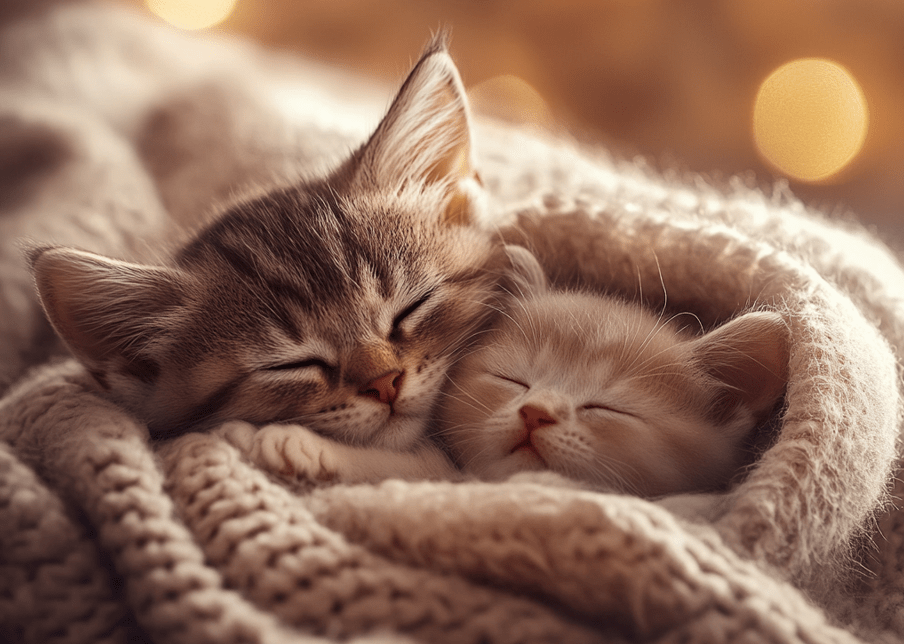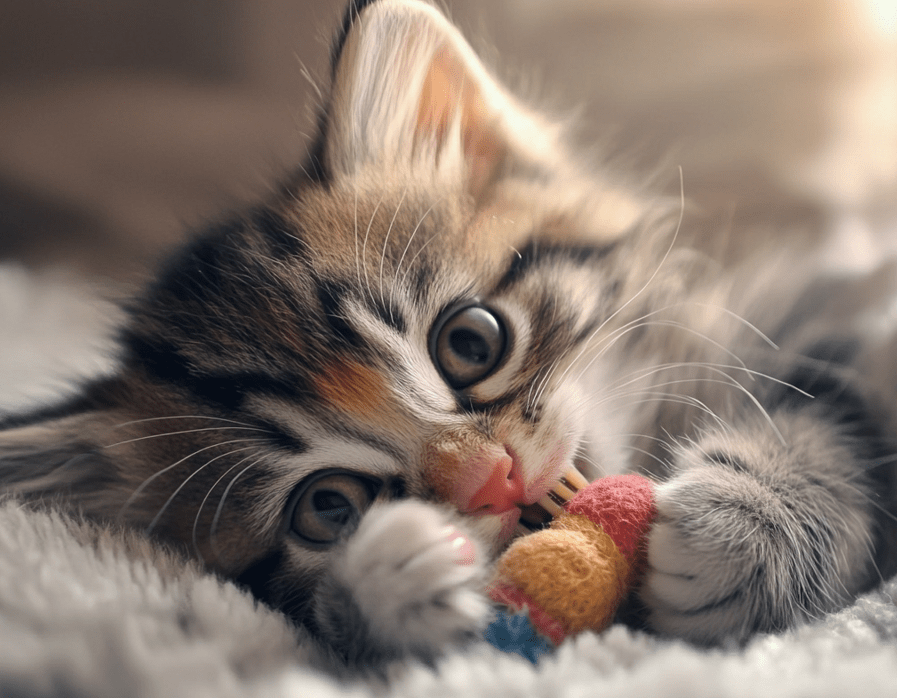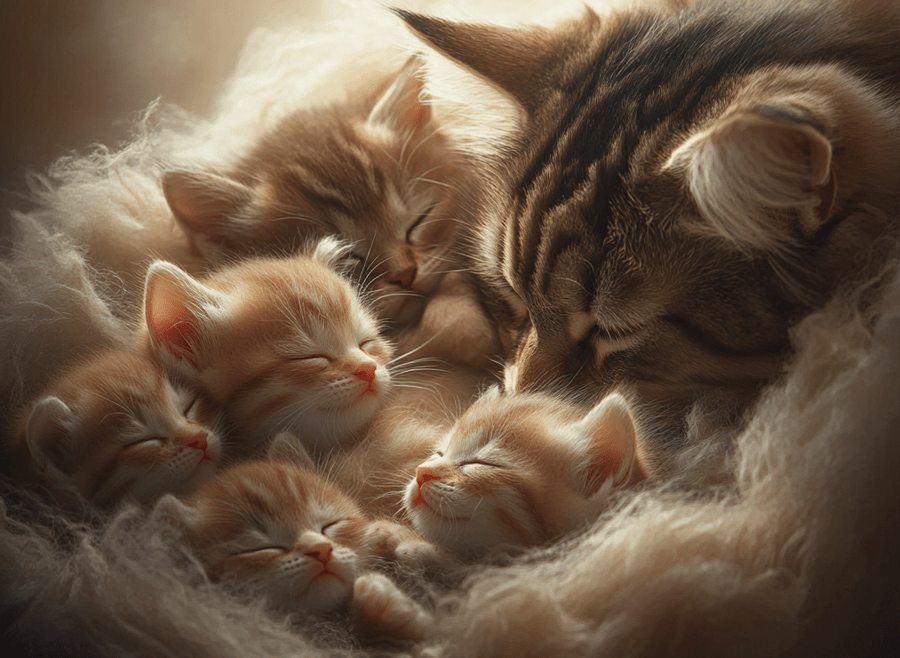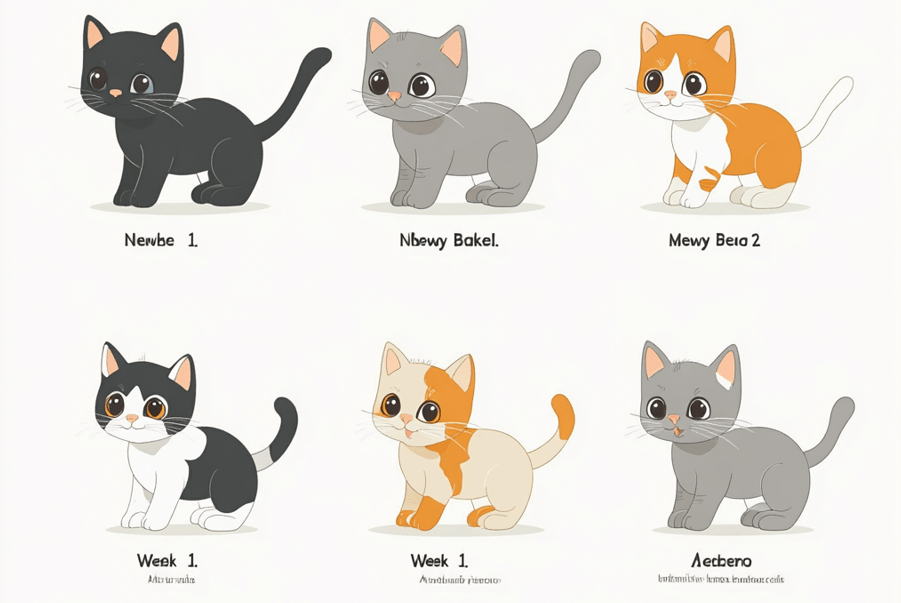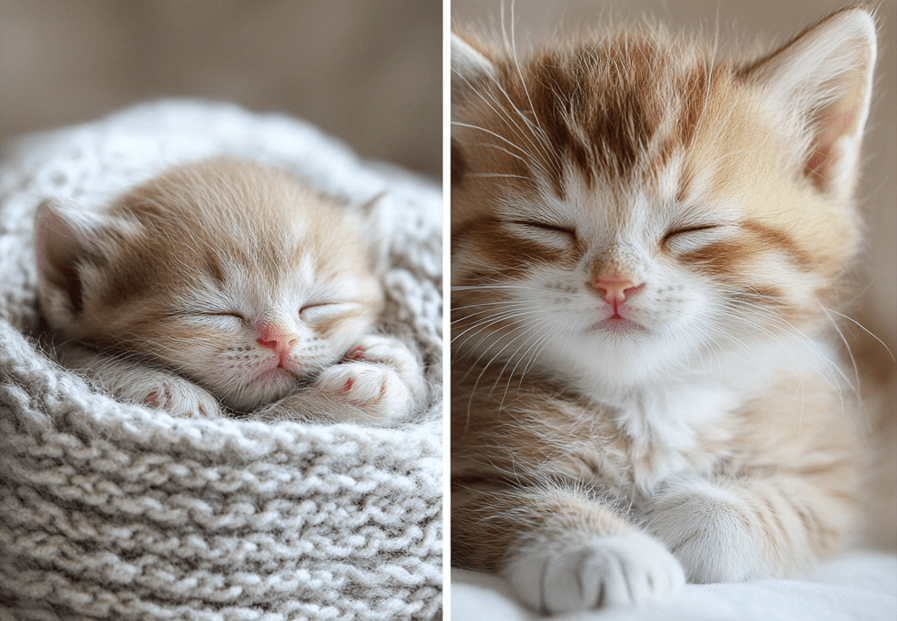
The first 8 weeks of life are a whirlwind of development for kittens. Newborn kittens are helpless, sightless and smaller than the palm of your hand. They can barely open their tiny eyes, but by 8 weeks of age, they are zipping around and chasing each other looking like miniature feline adults.
Patients in this age group also have different nutritional, toileting, veterinary and physical needs from week to week. Identifying a kitten’s age is key to understanding what kind of care the kitten requires and as to whether or not he is growing up normally.
OK so what are the kitten developmental milestones for the first 8 weeks of a kitten’s life? Let’s discuss this topic.
Newborn
Weight: 50–150 grams (1.8–5.3 ounces)
Feeding: give mother’s milk or formula every 2 hours.
Temperature of the Environment: 85–90 F
Physical features: eyes closed, ears folded, presence of cord, lack of teeth
1 week old
Weight: 150–250 grams (5.3–8.8 ounces)
Feeding: Every two hours mother milk or 10cc baby version formula substitute
Temperature of the environment: 85 F
Physical features: closed eyes, folded ears, toothless, and able to hold head up
2 weeks old
Weight: 8.8–12.3 ounce (250–350 grams)
Feeding: Mother’s milk or a formula replacement every three to four hours
Temperature of the environment: 80 F
Physical features: Eyes open and blue, ears small and round; still toothless taking initial wobbly steps
3 weeks old
Weight: 12.3–15.9 ounce (350–450 g)
Feeding: Every 4-5 hours, mother’s milk or substitute
Temperature of the environment: 80 F
Physical features: Blue eyes, erect but small ears and developing teeth
4 weeks old
Weight: 15.9 ounces -1. 2 pounds (450–550 grams)
Feeding: Mother milk or formula every 5 hours
Temperature of the environment: 70-75 F
Physical features: development of their cleaned teeth, use the scratch box, use toys
5 weeks old
Weight 1.2–1.4 lbs. (550–650 grams)
Feeding: Start off with a little bit of wet kitten food and ask for milk
Temperature of the environment: 70–75 F
Physical features: Premolar eruption may run and play without falling
6 weeks old
Weight: 650–750 grams (1.4–1.7 pounds)
Feeding: Weaned to wet food
Temperature of the environment: 70–75 F
Physical features: May have eye and ear characteristics, all molars but still no strings.
7 weeks old
Weight: 750–850 grams (1.7–1.9 lbs.)
Feeding: Wet food, can start to eat dry food
Temperature of the environment: 70–75 F.
Physical features: All baby teeth erupted, eye color changing from blue, male kittens – testicles begin to descend
8 weeks old
Weight: 1.9–2.1 pounds (850 to 950 grams).
Feeding: Wet food and dry food
Temperature of the environment: 70–75 F
Physical features: Eyes changed to adult color, active and agile, an eligible age for neutering/spaying
Newborn Kittens
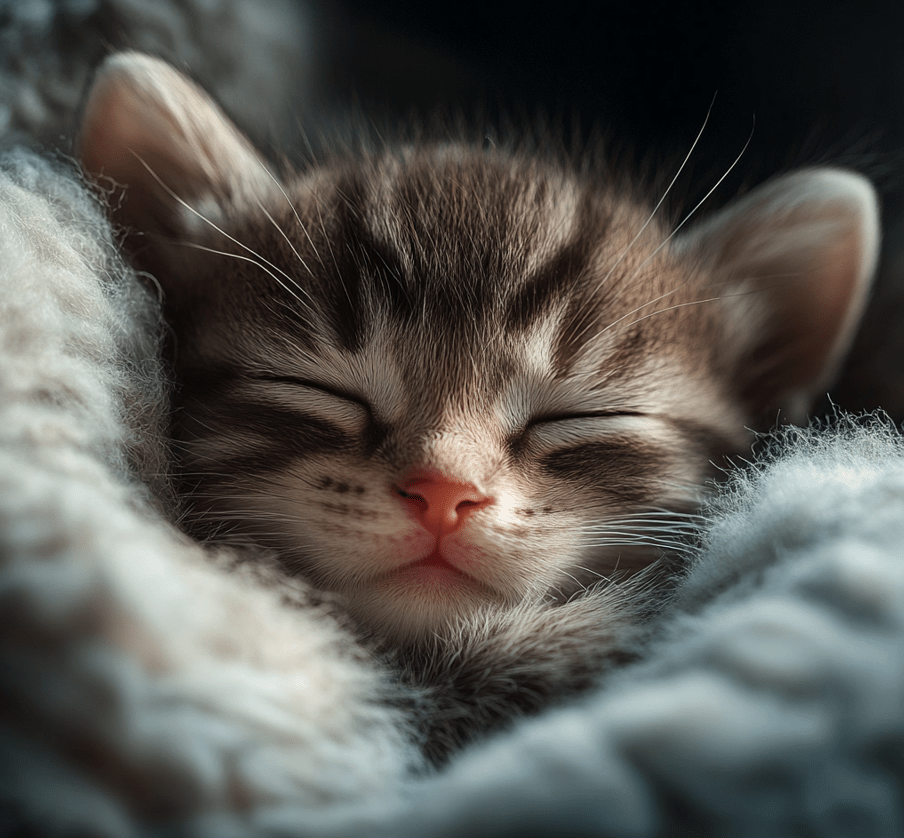
Weight:
50–150 grams (1.8–5.3 ounces)
Physical Development
During the initial weeks, all internal and external openings on a kitten’s will remain sealed shut. Baby kittens won’t be able yet to independently emit their meows, see quite clearly or open up either of their ear flaps. They will be completely toothless and their gums, nose, and paws may look reddish pink. They also do not yet have the ability to thermoregulate or a gag reflex.
This is where the umbilical cord will be connected; it will then fall off on its own around 4 to 5 days of age. Their nails are non-retractable.
As little ones this young living off of instinct, they are moving solely on scent and naturally crave warmth and comfort.
Behavioral Development
Newborns will sleep most of the time in the day so just rest. Due to the fact that newborn kittens cannot walk, they also cannot escape or defend themselves although there is a chance some could crawl away from their mom. A normal kitten in full health will be squirmy and make lots of noise when you pick it up.
Average Temperature
At birth, single kittens are warmed to 95—97 degrees Fahrenheit. A warm and steady heat source needs to be available for the kitten. The environment should be 85-90 degrees Fahrenheit for the kitten.
Care
Neonatal kittens must be with their mother around-the-clock. The mother will feed, clean, keep warm and help urinate.
When a mother is not present, the orphaned kittens should be bottle fed with kitten formula every two hours by an experienced caretaker and should be temperature-controlled as well as prompted to urinate.
1-Week-Old Kittens
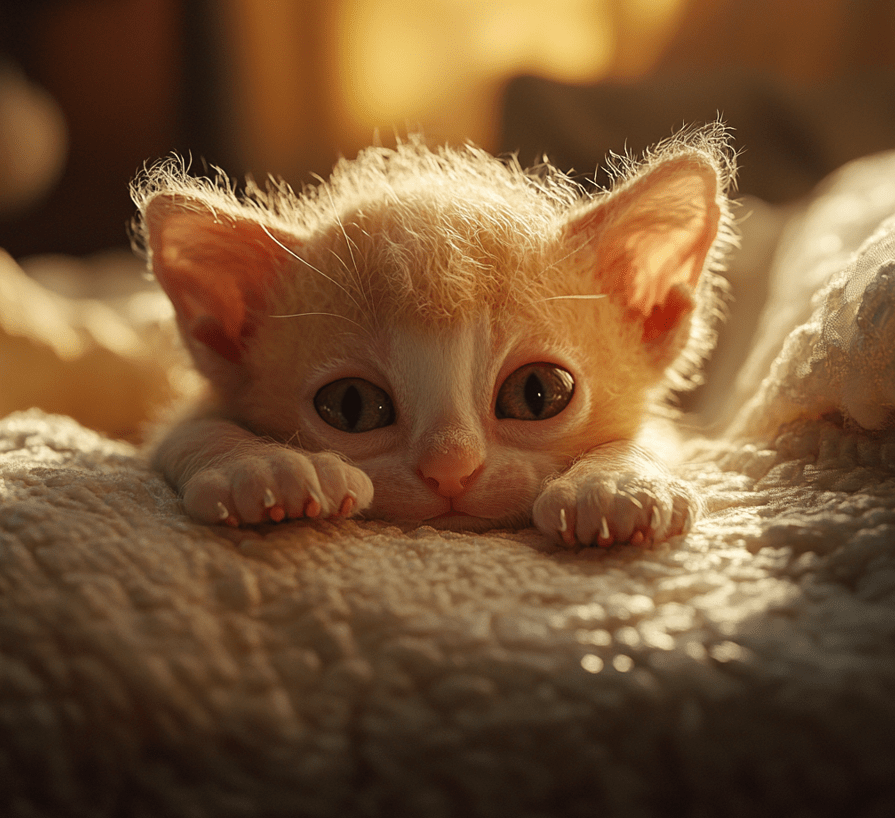
Weight:
5.3–8.8 ounces (150–250 grams) A kitten will have doubled his birth weight during the first 7 days of life.
Physical Development
7 day old kittens will have eyes shut and no umbilical cord. It will still be toothless/with non-retractable claws. The ear canals may begin to gradually open and the ears will partially unfold by 7 days of age.
Eyes will gradually begin opening from 8–12 days old over a period of several days. The eyes may be closed longer in one eye than the other, and it is essential to understand that the kitten’s eyes will open at their own speed. Kittens will be born with blue eyes, and only the adult eye color may be seen after birth.
Behavioral Development
Kittens that are two weeks old will be slightly larger than newborns, but still mostly frail and sleep for almost the entire day. By this age they also hold their head up, squirm to move using their limbs and become very vocal, even active when handled.
Average Temperature
Kittens should be 97–98 degrees F at this age, it is very important to keep the kitten warm and stable with some gentle heat. At this point the place where the kitten resides should be kept at around 85 degrees.
Care
Kittens listed as one-week-old need to be with mum 24/7. If the mother is not present, they need to be bottle and formula fed by an experienced caregiver every 2-3 hours around the clock, stimulated for going potty as one would nurture a newborn of any species, and kept warm.
2-Week-Old Kittens

Weight:
8.8–12.3 ounces (250–350 grams)
Physical Development
By 2 weeks old their eyes are fully open and baby blue. They will have terrible eyesight, not long-range vision. Ear canals are present, and ears settle small and rounded like a baby bear
The kitten’s teeth are not yet visible. They will still have non retractable claws.
Behavioral Development
Kittens At this stage, a 2-week-old baby is beginning to try out their new tracks by learning how to walk. They will however be ungainly on their legs and uncoordinated.
These kittens will be beginning to show some interest in their surroundings, but not yet playing and sleeping the majority of the time.
Average Temperature
Kittens should be 98–99 degrees F. You need to have a heating pad that is enclosed in something soft but breathable so the kitten does not get too hot or burn itself. The kitten should be maintained in an 80 degrees environment.
Care
Kittens that are two weeks old should be with their mother 100% of the time. Kittens who do not have a mother present need to be bottle fed every 3–4 hours with formula made for kittens, stimulated by a knowledgeable human to go potty, and kept at the proper temperature. Kittens 2 weeks old may start to dewormed.
3-Week-Old Kittens
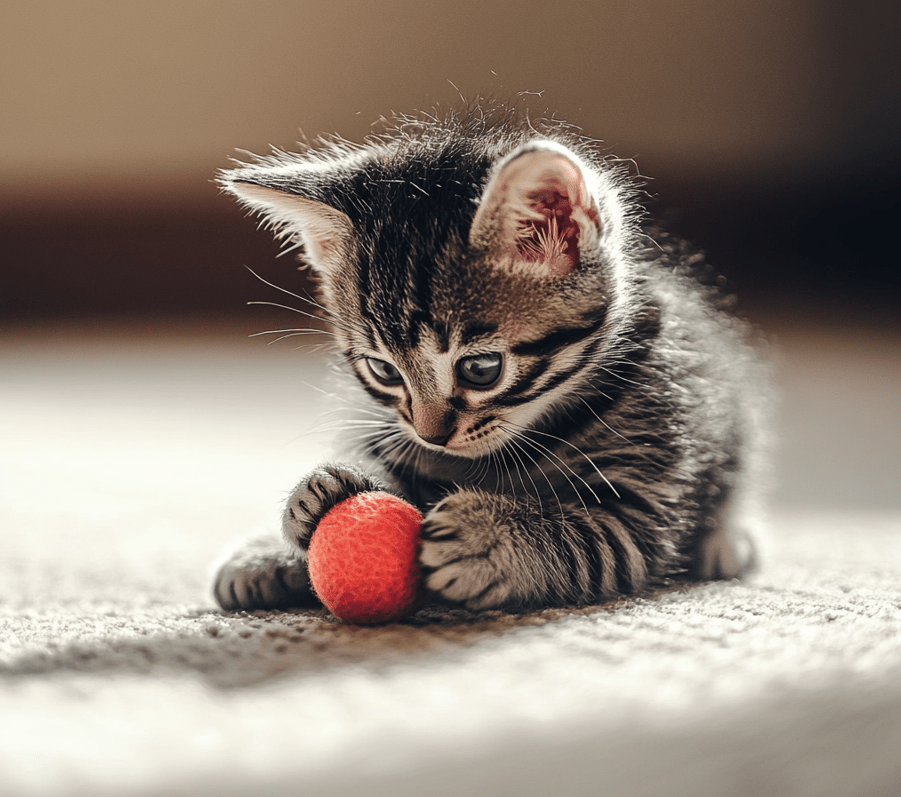
Weight:
350–450 grams (12.3–15.9ounces)
Physical Development
This is the real cat version, ears are starting to perk up and eyes are blue. The vision and hearing of the kitten will both improve as well.
A kitten will begin gaining its first baby teeth at this age. The incisors, which are the small teeth at the front of your baby’s mouth, will begin to appear. Kittens will start retracting their claws, but not all at once.
Behavioral Development
Kittens of this age will start walking around, investigating the area and possibly begin using the litter box. They will perhaps show curiosity towards cat toys, but their legs are not strong enough to run or follow moving objects.
They will likely sleep a lot and might start doing some rudimentary self-grooming. They will be associating better this week than others,
Average Temperature
Temperature should be 99 -100 degrees F (30.5C) for three-week-old kittens. They are more mobile by now and will start to wander off the heat source when not sleeping. The kitten’s environment should be roughly 75 degrees at this time.
Care
They will be best with their mum until at least 3 weeks old. Orphaned kittens require a knowledgeable person to bottle-feed them every four-to-five hours using kitten formula purchased from any pet food store. Provide a shallow cat litter box with non-clumping litter and watch to make certain they never lick at the litter.
4-Week-Old Kittens
Weight:
15.9 ounces–1. 2 pounds (450–550 grams)
Physical Development
By 4 weeks of age, your kittens will see more of their environment and will rely on all their senses. Canine Teeth your kitten’s teeth will continue to grow and eventually the long teeth next to the incisors, known as canine teeth, will begin to erupt through his gums. And their claws will retract.
Behavioral Development
Kittens of four weeks will be gaining the confidence to explore a little more and you may notice they are developing coordination as they wobble about on all fours learning how to walk, run and start playing. Their senses improve incredibly, and they become highly responsive beings who make eye contact with their caregiver frequently and react to the sights and sounds in their environment.
They may still struggle with the art of grooming, but are getting better. They will be being introduced to using a litter box.
Average Temperature
This value for a 4 weeks old kitten is around 99 Fahrenheit. So, provide heating, though kittens will use it only when sleeping. If your kitten is doing well in every other regard then monitor their temperature, as it should never drop below 70–75.
Care
Please remember four-week-old kittens need to be with their mom 24/7. If the orphans of this age are bottle fed, they should also be fed every 5 hours (yes…even overnight!). Most four-week-old kittens will be using their litter box and can start to be offered toys.
5-Week-Old Kittens
Average weight:
1.2 – 1.4 lb. (550 – 650 gm)
Physical Development
The baby teeth of a 5-week kitten will grow and the premolars will erupt. Eyes will be blue, ears are erect and pointed, click here; claws will retract.
Behavioral Development
Five week old kittens will be scampering and playing happily. They will be socialized with people and other animals. They will get better at grooming. By now, they will be experts at using the litter box.
Average Temperature
In a kitten of this age, their normal temperature will be in the range of 100-101 degrees F. Once the room or area is a pleasant 70–75 degrees, you no longer need a heat source.
Care
Offer food and water at all times. Never let the kitten get thin or show signs of poor body condition while weaning, always offer some supplemental feeding. A shallow litter box should always be available.
6-Week-Old Kittens
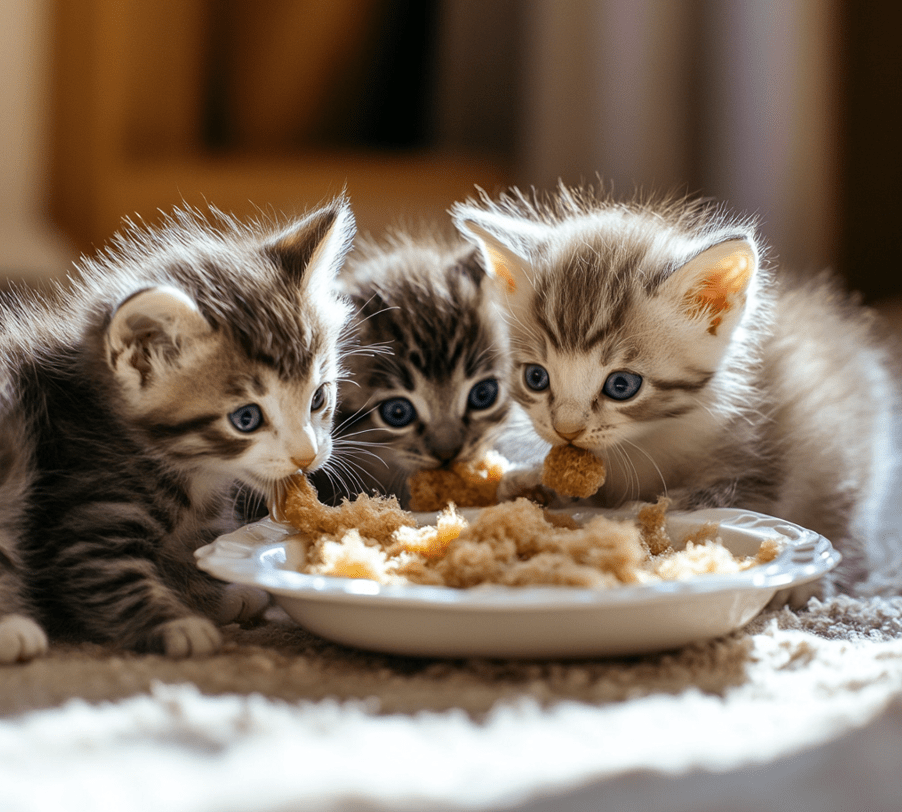
Weight:
1.4-1.7 pounds (650-750 grams)
Physical Development
A portion of the early development stage in the baby teeth will begin to be finalized as soon as a kitten is 6 weeks old. Those molars will come through a little. Eyes will remain blue and hearing and vision are completely mature.
Behavioral Development
Six-week old kittens will be well-socialized with littermates, play fighting, pouncing and starving on their own. They start to be inquisitive and want to understand their environment. In addition, they will be developing good grooming habits. At six weeks, kittens are increasingly coordinated and able to leap from low furniture that lands them safely on their feet.
Average Temperature
Body temperature should be 100–101 degrees F. At this point there is no additional heating source necessary, provided the environment remains comfortable 70–75 degree warmth.
Care
At this age, kittens should be getting plenty of kitty wet food. Be sure to keep fresh water, food and a shallow litter box with plenty of space. Vaccinate First FVRCP at 6 weeks — protect against rhinotracheitis, calicivirus, and panleukopenia.
7-Week-Old Kittens
Weight:
1.7–1.9 lb. (750–850 g)
Physical Development
At 7 weeks you will have 12 weeks of teeth. The kitten will start to change eye color and resemble adult colors. Testicles in male kittens may start to descend when they are about 7 weeks of age
Behavioral Development
Your seven-week-old kitten will have some high-energy spurts. Sleep deprivation shall increase, as well as playing time. By now kittens can romp, climb and jump off furniture with confidence.
Average Temperature
Seven week old kittens should be 100 – 101 degrees F, warm enough to not need a heating source but at the ideal room temperature of 70 – 75 degrees.
Care
Kittens should receive lots of kitten wet food and a small supplement of kitten dry food. Make sure they have water, food and a litter box in the same room.
8-Week-Old Kittens
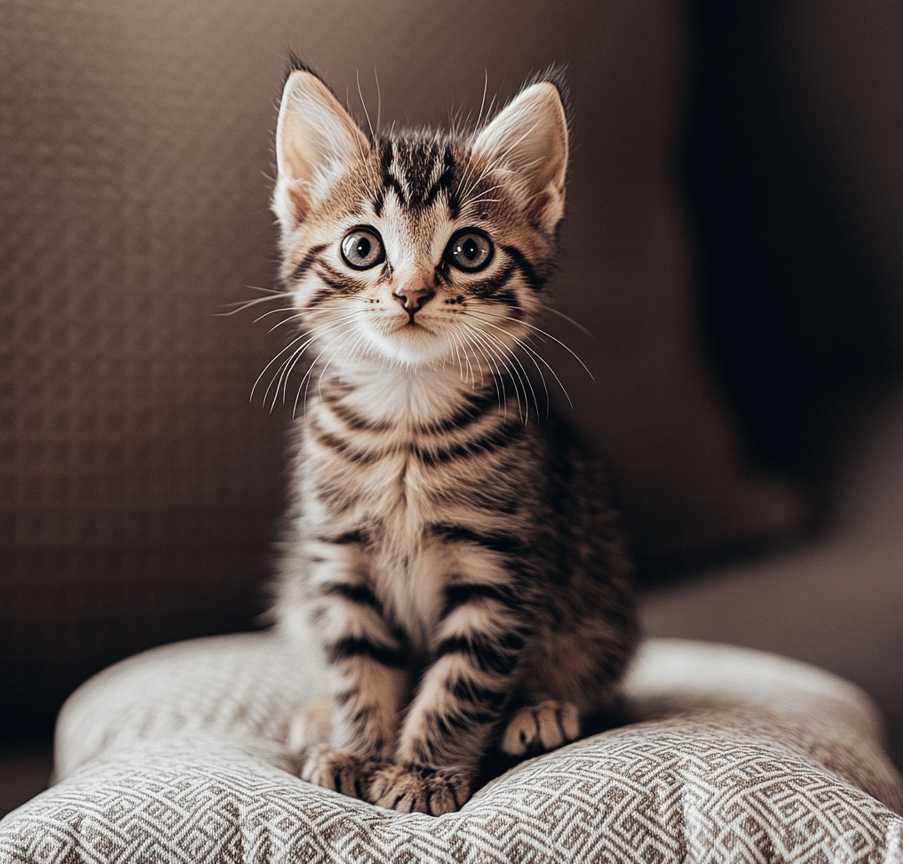
Weight:
1.9–2.1 pounds (850–950 grams)
Physical Development
A full set of baby teeth should be apparent at 8 weeks. Their eyes will have fully transitioned to the color green, yellow, brown or blue that they will be as adults. The ears will be in balance.
Behavioral Development
Kittens who are eight-weeks-old will be perky and kind of self-sufficient. They will have almost-fully-developed agility and coordination.
Average Temperature
Kittens this age may be around 100–101 degrees F. At the same time, a heating source is unnecessary provided the air temperature in your home is ultimately between 70 and 75 degrees F
Care
Kittens should have access to canned and dry kitten food 3−4 times a day and no group of calories needs to come from dry only. Always ensure they have access to water and a small, shallow litter box.
Kittens can also have a booster at this time if it has been 2 weeks since they received their first FVRCP vaccine. If the kitten has yet to be dewormed, an oral dewormed can be given. Running a fecal is a good idea and checking for internal parasites.
They may be adopted, spayed/neutered and microchipped if they weigh 2 pounds and are healthy.

